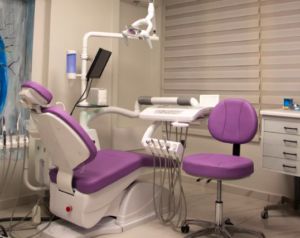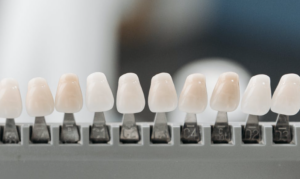Gums can recede for a number of reasons, including brushing too hard, gum disease, and aging. While it may not seem like a big deal, gum recession can actually lead to a number of problems, including tooth sensitivity and loss. So just how fast do gums recede?
The answer depends on the underlying cause. For example, if you brush too hard, your gums may recede over time. However, if you have gum disease, your gums can recede quite quickly. In some cases, they may even recede within a matter of weeks or months.
Of course, the rate at which your gums recede also depends on your age. As we age, our gums naturally begin to recede. In fact, it’s estimated that up to 12% of Americans over the age of 65 have some degree of gum recession.
How To Prevent Gums From Receding?
If you’re concerned about gum recession, there are a few things you can do to prevent it from happening. First, be sure to brush gently. Brushing too hard can actually damage your gums and lead to recession.

You should also see your dentist regularly for cleanings and checkups. This will help ensure that any early signs of gum disease are caught and treated before they become a problem.
Finally, if you smoke, quitting can stop your gums from receding. Smoking is a major risk factor for gum disease, so quitting is one of the best things you can do for your oral health.
If you’re already experiencing gum recession, there are treatments available to help restore your gums. However, it’s important to catch it early, so be sure to see your dentist if you notice any changes in your gum line.
The bottom line is that gum recession can be a serious problem, but it’s one that you can take steps to prevent. Be sure to brush gently, see your dentist regularly, and quit smoking if you want to keep your gums healthy.
Can Gums Recede Overnight?
No, gums do not typically recede overnight. Gum recession is usually a gradual process that occurs over time due to factors like poor oral hygiene, brushing too hard, gum disease, or even aging. However, certain aggressive forms of gum disease or trauma to the gums could potentially cause noticeable recession in a short period. It’s important to maintain good oral hygiene and visit your dentist regularly to catch any signs of gum recession early.
Do Gums Recede Easily?
Gums can recede relatively easily if they are not properly cared for. Brushing too hard, using a toothbrush with hard bristles, or poor oral hygiene can contribute to gum recession. Additionally, habits like smoking and chewing tobacco can increase the risk. Gum disease is another major factor that can cause gums to recede more quickly. Regular dental check-ups and proper brushing and flossing techniques are essential in preventing gum recession.
Can Receding Gums Grow Back?
Once gums have receded, they typically do not grow back on their own. However, there are treatments available that can help restore the gum line. Procedures like gum grafting can cover exposed roots and protect your teeth. It’s crucial to address the underlying cause of the gum recession to prevent further damage and maintain overall oral health.
At What Age Does Gum Recession Start?
Gum recession can start at any age, but it is more common as people get older. It’s estimated that a significant percentage of adults over the age of 40 experience some degree of gum recession. However, young people can also experience gum recession due to aggressive brushing, poor oral hygiene, or orthodontic treatments. Regular dental visits and good oral care routines are important at any age to help prevent gum recession.
How To Treat Gums That Have Already Receded?
If you already have gum recession, there are a few treatment options available. These include:
Gum grafting: This procedure involves taking tissue from another part of your mouth and using it to cover the exposed root.
Flap surgery: This surgery involves lifting back the gum tissue and removing any tartar buildup. The tissue is then repositioned and sutured into place.
Pocket reduction: This surgery involves making small incisions in the gum tissue to remove any tartar buildup. The gum is then sutured into place.
While these procedures can be effective, they’re also invasive and can be quite costly. In some cases, your insurance may not even cover the cost of treatment.
Does Gingivitis Cause Gum Recession?
Gingivitis is an inflammation of the gums that can lead to gum disease. While gingivitis doesn’t necessarily cause gum recession, it can increase your risk for developing the condition. That’s because gingivitis weakens the attachment between the gum and tooth, which can eventually lead to recession.
If you have gingivitis, it’s important to see your dentist so that the condition can be treated. Untreated gingivitis can eventually lead to periodontitis, which is a more serious form of gum disease. Periodontitis can not only cause gum recession, but it can also lead to tooth loss.
Contact Lane and Associates Family Dentistry
If you notice that your gums are receding, it’s important to see your dentist as soon as possible. Gum recession can be a sign of gum disease, which is a serious condition that needs to be treated.
At Lane and Associates Family Dentistry, we offer a full range of dental services, including treatment for gum disease. We also offer a variety of preventative services, such as teeth cleanings and fluoride treatments, to help keep your smile healthy.






